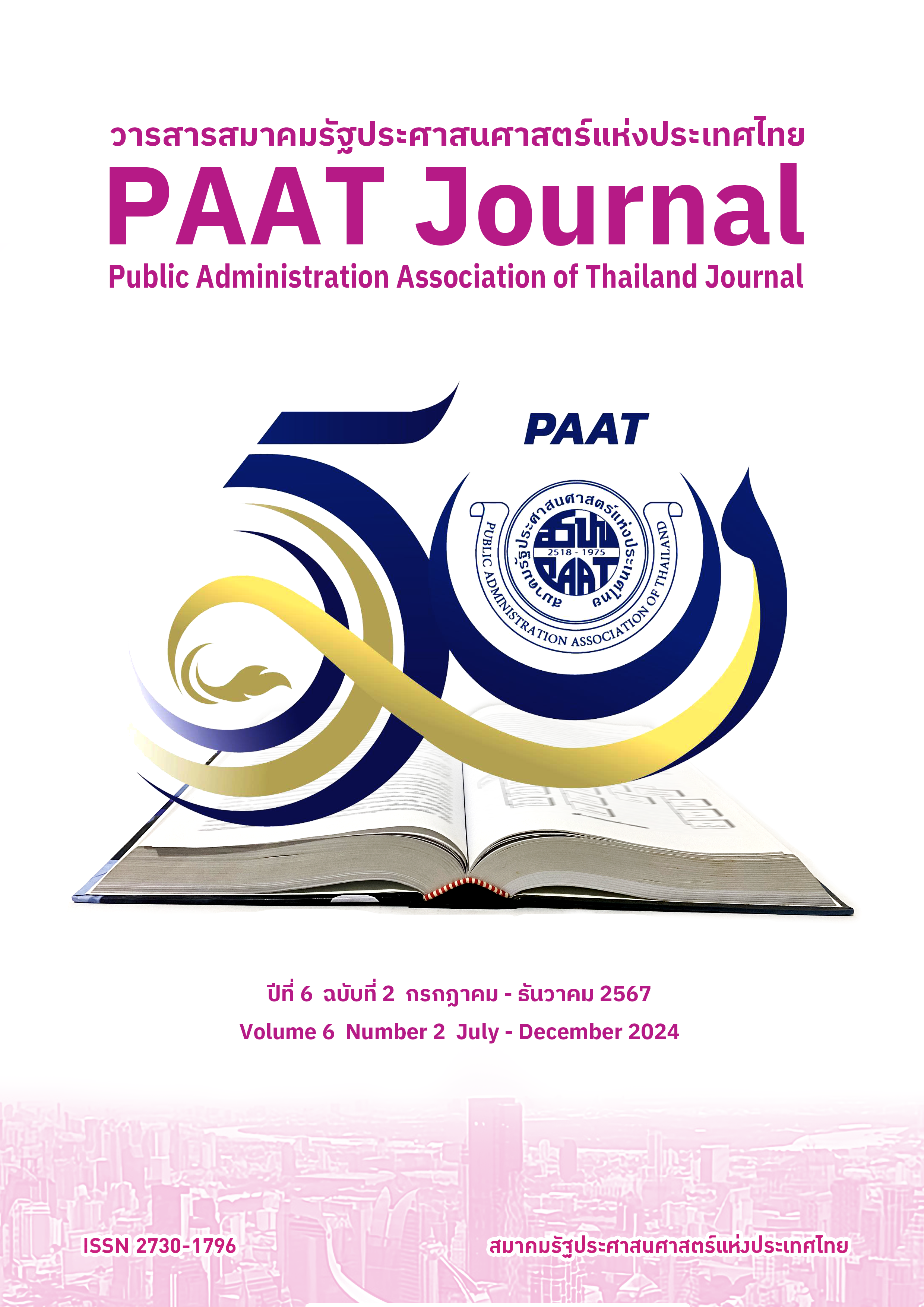การสะท้อนคิดแพลตฟอร์มเกมฝึกทักษะด้านการวิจัยพื้นฐาน
คำสำคัญ:
การเรียนรู้ผ่านเกมดิจิทัล, ทักษะการวิจัยพื้นฐาน, ประสบการณ์นักศึกษาบทคัดย่อ
บทความนานาทัศนะชิ้นนี้ มีจุดมุ่งหมายในการสำรวจแนวทางการสอนแบบใหม่สำหรับพัฒนาทักษะการวิจัยพื้นฐานด้วยแพลตฟอร์มเกมดิจิทัลจากประสบการณ์ของผู้เขียนในฐานะผู้พัฒนาแพลตฟอร์ม สาระหลักของบทความได้แก่ 1) การสะท้อนประสบการณ์พัฒนาแพลตฟอร์มเกมดิจิทัล 2) ความสนใจของผู้เรียนในการใช้เกม และ 3) การบรรลุเป้าหมายการเรียนรู้ที่คาดหวัง ผลลัพธ์จากกระบวนการดำเนินงาน การติดตาม และรับฟังข้อคิดเห็นอันหลากหลาย นักศึกษาสะท้อนว่าแพลตฟอร์มเกมสร้างความสนุกสนาน การมีส่วนร่วม และความอยากรู้อยากเห็นเพิ่มขึ้นโดยส่วนใหญ่สะท้อนประสบการณ์ที่เป็นบวกเกี่ยวกับนวัตกรรมการเรียนรู้นี้ อย่างไรก็ตามในการบรรลุเป้าหมายเฉพาะด้านทักษะการคิดแพลตฟอร์มเกมดิจิทัลไม่ได้เพิ่มผลการเรียนรู้ของผู้เรียนอย่างมีนัยสำคัญ แต่อาจเป็นทางเลือกที่มีคุณค่าและมีความน่าสนใจเมื่อเปรียบเทียบกับวิธีการสอนแบบดั้งเดิมทั้งยังช่วยสร้างทัศนคติเชิงบวกต่อการเรียนรู้ในรูปแบบดิจิทัลที่ไม่เคยปรากฏมาก่อน
เอกสารอ้างอิง
Head, A. J. (2013). Learning the ropes: How freshmen conduct course research once they enter college. Project Information Literacy Research Report. URL: https://projectinfolit.org/ publications/learning-the-ropes/
Julien, H. (2005). Education for information literacy instruction: A global perspective. Journal of Education for Library and Information Science, 46(3), 210-216. URL: https://doi.org/ 10.2307/40323845
Hosein, A., & Rao, N. (2017). Students' reflective essays as insights into student centred-pedagogies within the undergraduate research methods curriculum. Teaching in Higher Education, 22(1), 109-125. DOI:10.1080/13562517.2016.1221804
Lindgren, R., & McDaniel, R. (2012). Transforming online learning through narrative and student agency. Journal of Educational Technology & Society, 15(4), 344-355. URL: https://www.jstor .org/stable/jeductechsoci.15.4.344
Holland, M.(2008). Seeking meaning: A process approach to library and information services. The Electronic Library, 26(2), 279-280. https://doi.org/10.1108/02640470810864208
Gee, J. P. (2003). What video games have to teach us about learning and literacy. URL: https://www.researchgate.net/publication/220686314_hat_Video_Games_Have to_Teach_Us_About_Learning_and_Literacy
Prensky, M. (2001). Digital game-based learning. New York: McGraw-Hill.
Shaffer, D. W., Squire, K. R., Halverson, R., & Gee, J. P. (2005). Video games and the future of learning. Phi Delta Kappan, 87(2), 105-111. https://doi.org/10.1177/003172170508700205
Brew, A. (2013). Understanding the scope of undergraduate research: A framework for curricular and pedagogical decision-making. Higher Education, 66(5), 603-618. https://doi.org/10.1007 /s10734-013-9624-x
Lameras, P., Arnab, S., Dunwell, I., Stewart, C., Clarke, S., & Petridis, P. (2017). Essential features of serious games design in higher education: Linking learning attributes to game mechanics. British Journal of Educational Technology, 48(4), 972-994. https://doi.org/10.1111/bjet.12467
Clark, D. B., Tanner-Smith, E. E., & Killingsworth, S. S. (2016). Digital games, design, and learning: A systematic review and meta-analysis. Review of Educational Research, 86(1), 79-122. DOI: 10.3102/0034654315582065
Piaget, J. (1972). The psychology of the child. New York: Basic Books. URL: https://www.hachettebookgroup.com/titles/jean-piaget/the-psychology-of-the-child/9780465095001/?lens=basic-books
Ryan, R. M., & Deci, E. L. (2000). Intrinsic and extrinsic motivations: Classic definitions and new directions. Contemporary Educational Psychology, 25(1), 54-67. https://doi.org/10. 1006/ceps.1999.1020
Mayer, R. E. (2001). Multimedia learning. Cambridge University Press. URL: https://books. google.co.th/books/about/MultimediaLearning.html?id=jMfjDwAAQBAJ&redir_esc=y
Squire, K. (2011). Video games and learning: Teaching and participatory culture in the digital age. Teachers College Press. URL: https://www.researchgate.net/publication/259532938_Video_Games_and_Learning_Teaching_and_Participatory_Culture_in_the_Digital_Age
Wouters, P., Van Nimwegen, C., Van Oostendorp, H., & Van Der Spek, E. D. (2013). A meta-analysis of the cognitive and motivational effects of serious games. Journal of educational psychology, 105(2), 249. URL: https://doi.org/10.1037/a0031311
Squire, K. (2006). From content to context: Videogames as designed experience. Educational researcher, 35(8), 19-29. URL: https://doi.org/10.3102/0013189X035008
Mayer, R. E. (2014). Computer games for learning: An evidence-based approach. MIT Press. URL: https://www.google.co.th/books/edition/Computer_Games_for_Learning/5sgIBAAAQBAJ?hl=en&gbpv=1&dq=Mayer,+R.+E.+(2014).+Computer+games+for+learning&printsec=frontcover
Johnsen, H. M., Fossum, M., Vivekananda-Schmidt, P., Fruhling, A., & Slettebø, Å. (2016). Teaching clinical reasoning and decision-making skills to nursing students: Design, development, and usability evaluation of a serious game. International Journal of Medical Informatics, 94, 39-48. DOI: 10.1016/j.ijmedinf.2016.06.014
Sadler, T. D., Romine, W. L., Stuart, P. E., & Merle-Johnson, D. (2015). Game-based curricula in biology classes: Differential effects among varying academic levels. Journal of Research in Science Teaching, 52(1), 114-135. https://doi.org/10.1002/tea.21085
ดาวน์โหลด
เผยแพร่แล้ว
รูปแบบการอ้างอิง
ฉบับ
ประเภทบทความ
สัญญาอนุญาต
ลิขสิทธิ์ (c) 2024 PAAT Journal (วารสารสมาคมรัฐประศาสนศาสตร์แห่งประเทศไทย)

อนุญาตภายใต้เงื่อนไข Creative Commons Attribution-NonCommercial-NoDerivatives 4.0 International License.



